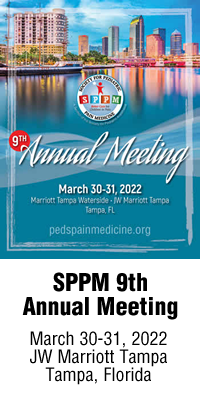Annual Meeting Reviews
Advocacy for Children’s Pain: Not for the Faint of Heart
By Deepa Kattail, MD, MHS, FAAP
Department of Anesthesiology
McMaster University, McMaster Children’s Hospital
Hamilton, Ontario, Canada
Our final session of the Virtual 8th Annual Meeting of SPPM was by Keynote Speaker, Gary Walco, PhD, presenting on advocacy for children’s pain, a fitting topic for a clinician whose career has been focused on pediatric pain medicine. Dr. Walco, Professor of Anesthesiology, (adj.) Pediatrics, and Psychiatry at University of Washington School of Medicine and Seattle Children’s Hospital, opened his lecture with a great quote by Mohandas Gandhi, that set the stage for his important talk, “We Must Become the Change We Want to See.”
Dr. Walco started by giving us a review of pediatric pain as a young specialty, given that pain even existing in infants and children was only recognized within the last 40 years, prior to which pain was frankly ignored in this vulnerable group. Dr. Walco cited his own first authored paper that was published in the prestigious New England Journal of Medicine on the ethics of pain control, boldly stating that “failure to provide adequate control of pain amounts to substandard and unethical medical practice”. Although, this seems obvious to those of us who finished our training more recently, it was novel and culture changing at that time!
Dr. Walco then reviewed his own trajectory and achievements through his career as an expert in pediatric pain medicine. This included being one of the first May Day Fellows and thus led to media appearances in national TV and newspapers to help spread the word on pain in childhood. Dr. Walco also published a book on pain management aimed at pediatricians. Dr. Walco then detailed his advocacy work with the FDA, and more recent work with the NIH resulting in a National Pain Strategy published in 2016. The opioid crisis presented further opportunities for Dr. Walco to establish his expert presence in the media including issues around use of opioids in pediatric patients with chronic pain.
Dr. Walco’s final thoughts on being an advocate for pediatric pain….patience and persistence are critical and change in clinical practice is often a slow process. Advocacy efforts could be from an institutional level or from a larger approach such as federal efforts via political/government efforts. Dr. Walco warned that international efforts, although well intentioned, usually are difficult to implement across different countries and oftentimes, advocacy efforts are more fruitful at a national level.
Overall, it was inspiring to hear of all the work Dr. Walco has been involved in, and his career has followed along with the creation and progression of pediatric pain medicine as a specialty. Hearing his advice, was also inspiring as we have all experienced the need to advocate for novel practices in pain management and often a change in culture is needed to achieve such goals. Personally, I felt inspired hearing this lecture as the concluding speaker of our virtual meeting and I’m sure I was not alone in this sentiment!




